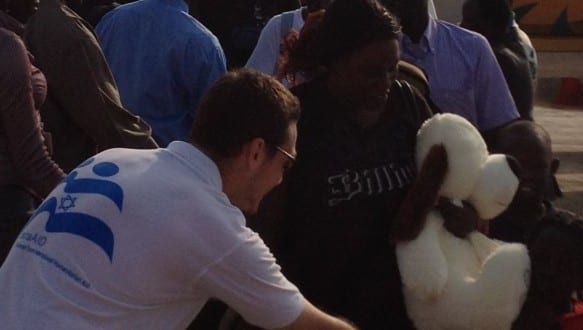“…and they shall fight every one against his brother, and everyone against his neighbour; city against city, and kingdom against kingdom.” (Isaiah 9:2)

Three Israeli aid workers from IsraAID, a non-profit NGO “committed to providing life-saving disaster relief and long term support,” have taken refuge along with thousands of others as rebels attempt to overthrow the government in South Sudan.
The Republic of South Sudan is the world’s youngest country, having been formed in July 2011. It was carved out of Sudan after years of conflict between the predominantly Islamic north and the non-Muslim residents of the southern region. South Sudan is populated primarily by Animists (those who hold tribal beliefs) and Christians.
According to the International Christian Concern, an advocacy group linking free Christians with those suffering persecution, since the secession of South Sudan from the North, the Sudanese government has engaged in unrestrained intimidation and discrimination of Christians living in the North. Not only has this persecution generated a mass-exodus of many Northern Christians, but it has had greatly damaged the political structure of Sudanese opposition groups.
The ongoing turmoil and conflict, both between the two countries and within South Sudan itself, has created a sense of desperation among those who had hoped for a better life. South Sudan promised to offer religious freedom to all, but reports of abuses by those in power abound. As well, armed tribal conflicts continue unabated in the fledgeling state.
The current coup is said to have been spearheaded by former Vice President Riek Machar, who was fired in July along with the rest of the cabinet. Machar accuses President Salva Kiir of acting to consolidate his power and remain at the top indefinitely. He warned after he was fired that for South Sudan to survive, it cannot tolerate “one man’s rule or it cannot tolerate dictatorship.”
President Kiir claimed the government is now “in full control of the military situation” in Juba, where the attempted coup took place. He ordered a dawn-till-dusk curfew in the entire city.
IsraAID founding director Shachar Zahavi spoke to The Times of Israel about the three aid workers trapped in South Sudan. “I hope they are not in danger as long as they stay away from the streets. They are in a closed compound. I hope we will be able to evacuate them within a day or two.
“All foreigners are just waiting in closed compounds, and we are waiting to see how to evacuate the team,” he said. The borders and airports were all closed following the uprising, but Israel is coordinating with the French and American embassies in Juba, as well as with the Israeli Foreign Ministry, to extricate the three.
Sporadic communication with those trapped has been primarily through email. One of the IsraAID workers, Ophelie Namiech, wrote the following: ”In the early morning, residents of my compound, including local staff, were all maddened, not knowing what was going on. We realized we were stuck, as movement was impossible amidst gunfire. It sounded like we were in the middle of a warzone.
“The entire city is under siege by the army.
“Information remains limited. Communication networks are interrupted from time to time. Hundreds of civilians have been seeking refuge in the UN compounds, a large number being women and children,” she said.
Hilde Johnson, special representative of the United Nations secretary-general for South Sudan, said in a statement that the UN mission in Juba was “deeply concerned” over the fighting that broke out late Sunday and which continued Monday.
“As the Special Representative of the Secretary General I urge all parties in the fighting to cease hostilities immediately and exercise restraint,” the statement said. “I have been in touch regularly with the key leaders, including at the highest levels to call for calm.”




